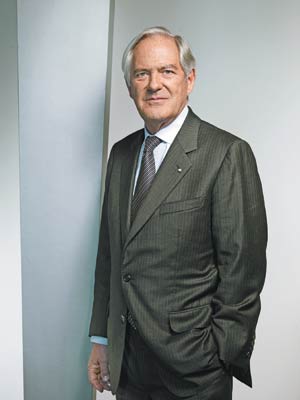Mature vocational system to aid growth
Updated: 2014-07-28 20:37
By Wang Chao
|
|||||||||||
Trust the Germans to come up with the goods when it comes to technology and engineering, and the marketing item. The country that brought us "Das Auto" and "Vorsprung durch Technik" (Progress through technology) has now introduced to the world "Industry 4.0". That is the moniker the German government has adopted to describe the mass computerization and mechanization of traditional industries, which some are calling the fourth industrial revolution.
|
 Roland Berger says while China's manufacturing industry has made huge strides in the past 30 years, there is still a great deal of room for improvement. CHINA DAILY
|
While China's manufacturing industry has made huge strides in the past 30 years, there is still a great deal of room for improvement, he says, not to mention opportunities for China and Germany to work together.
"China and Germany are already much more similar than they are different in terms of income and level of development. Both are highly industrialized, open, manufacturing-oriented, export-focused economies. Both are clear winners of the past several decades of globalization and both have successfully weathered the global financial crisis."
Berger was born in 1937, and his father Georg was the head of a food company and for a time a top official in the economics ministry of the Third Reich before quitting in the aftermath of Kristallnacht in November 1938. Near the end of World War II, Berger senior was a prisoner in Dachau concentration camp.
Roland Berger founded his consultancy in Munich in 1967 after quitting as a partner in an American consulting firm based in Boston and Milan.
Roland Berger Strategy Consultants has since grown into one of the world's top five strategy consultancies. Starting with the company's founding, Berger was CEO for 36 years, and until 2010 chairman of the supervisory board.
Just as the consultancy has changed dramatically over the years, Berger says the phrase "Made in Germany" has taken on a completely different dimension. For most people it denotes top quality, he says, which was not always the case.
"The label was originally introduced in Britain by the government to mark German products more obviously, as German manufacturers had been falsely labeling inferior goods with the marks of renowned British manufacturing companies and importing them into the United Kingdom."
Not until later, when German manufacturing standards improved, did "Made in Germany" become associated with product reliability and quality, Berger says.
Today's Top News
Developers placing bets on casinos overseas
Scrutiny on iPhone data access
Russian fighter jet crash kills pilot
US-Russia relations frosty
Harsher safety measures urged amid scandal
Drills to have 'little impact' on civilian air services
Revision of decree protects military airports
Experts slam Japan's bid to break order
Hot Topics
Lunar probe , China growth forecasts, Emission rules get tougher, China seen through 'colored lens', International board,
Editor's Picks

|

|

|

|

|

|





